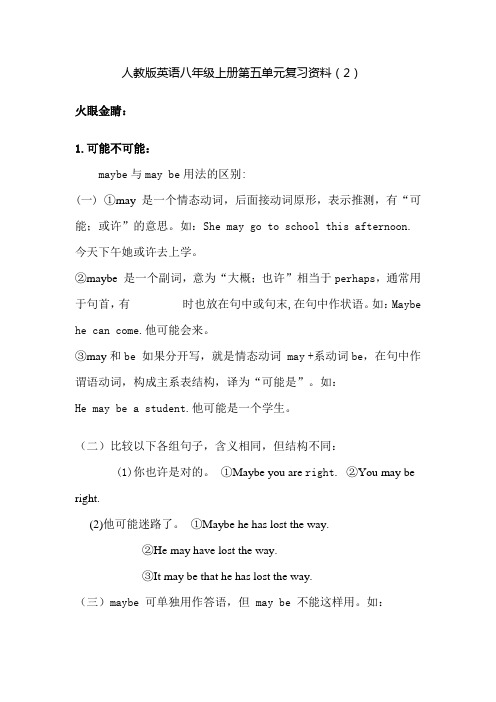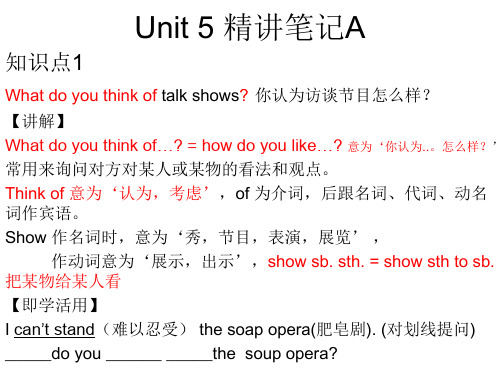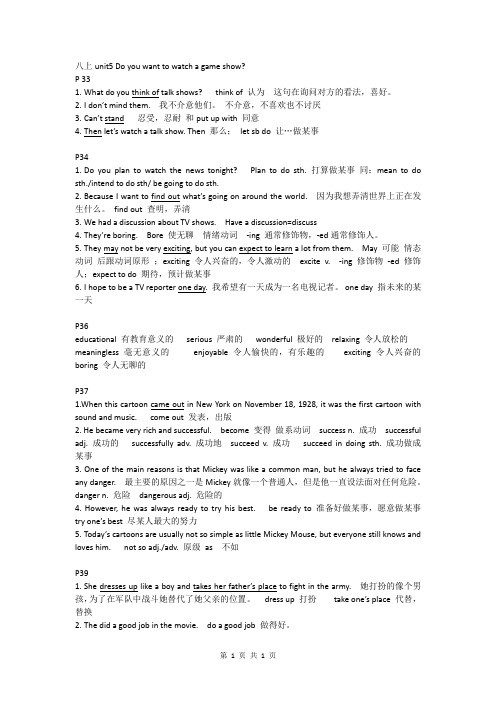新人教版八年级英语上unit5复习
最新人教版八年级英语上册Unit5重点句型加语法小结

最新人教版八年级英语上册Unit5重点句型加语法小结本文档总结了最新人教版八年级英语上册Unit 5的重点句型和语法知识。
1. 句型1.1. There be 句型- There is a book on the desk.(桌子上有一本书。
)- There are many students in the classroom.(教室里有很多学生。
)1.2. 肯定句、否定句与疑问句- She is reading a book.(她正在看一本书。
)- She is not reading a book.(她没有看书。
)- Is she reading a book?(她在看书吗?)1.3. 直接引语和间接引语- He said, "I like playing basketball."(他说:“我喜欢打篮球。
”)- He said that he liked playing basketball.(他说他喜欢打篮球。
)2. 语法2.1. There be 句型There be 句型用于描述某地或某物存在与否。
- There is/are + 名词 + 位置(单数/复数)2.2. 一般现在时一般现在时表示经常性、惯性的动作,或客观真理等。
- 结构:主语 + 动词(原形)+ 其他- She likes playing soccer.(她喜欢踢足球。
)2.3. 一般过去时一般过去时表示过去某个时间里发生的动作或存在的状态。
- 结构:主语 + 动词的过去式 + 其他- He went to the park yesterday.(他昨天去了公园。
)2.4. 一般将来时一般将来时表示将来某个时间里可能发生的动作或存在的状态。
- 结构:主语 + will + 动词原形 + 其他- I will visit my grandparents next week.(下周我将去看望我的祖父母。
)2.5. 直接引语和间接引语直接引语是原话的表达,间接引语是根据原话的表达意思进行的转述。
人教版英语八年级上册Unit5复习单词及词性短语句子默写

人教版英语八年级上册Unit5 单词短语周周清1.__________ /'sɪtkɒm/, /'sɪtkɑ:m/n.情景喜剧2.__________ /nju:z/,/nu:z/ n.新闻节目;新闻3.__________ "/səʊp/ /'ɒprə/, /'ɑ:prə/" n.肥皂剧4.__________ /ˌedʒu'keɪʃənl/ adj.教育的;有教育意义的5.__________ /plæn/ v.&n.打算;计划6.__________ /həʊp/ v.&n.希望7.__________ /dɪ'skʌʃn/ n.讨论;商量8.__________ /stænd/ v.忍受;站立9.__________ /'hæpən/ v.发生;出现10.__________ / meɪ/ modal v.也许;可能;可以11.__________ /ɪk'spekt/ v.预料;期待12.__________ /dʒəʊk/ n.笑话;玩笑13.__________ /'kɒmədi/, /'kɑ:mədi/ n.喜剧;喜剧片14.__________ /'mi:nɪŋləs/ adj.毫无意义的;意思不明确的15.__________ /'ækʃn/ n.行动16.__________ /kɑ:(r)'tu:n/n.动画片;卡通片17.__________ /'kʌltʃə(r)/ n.文化;文明18.__________ /'feɪməs/ adj.著名的;出名的19.__________ /ə'pɪə/, /ə'pɪr/ v.出现20.__________ /bɪ'kʌm/ v. (became /bɪ'keɪm/)开始变得;变成21.__________ /rɪtʃ/ adj.富有的22.__________ /sək'sesfl/ adj.获得成功的;有成就的23.__________ /maɪt/ modal v.可能;可以24.__________ /meɪn/ adj.主要的;最重要的25.__________ /'ri:zn/ n.原因;理由26.__________ /'kɒmən/, /'kɑ:mən/ adj.普通的;常见的27.__________ /fɪlm/ n.电影28.__________ /ʌn'lʌki/ adj.不幸的;不吉利的29.__________ /lu:z/ v. (lost /lɒst/, /lɑ:st/)失去;丢失30.__________ /'gɜ:(r)lfrend/ n.女朋友31.__________ /'redi/ adj.愿意的;准备好的32.__________ /'kærəktə(r)/ n.人物;角色33.__________ /'sɪmpl/ adj.简单的;易做的34.__________ /'ɑ:(r)mi/n.陆军;陆军部队1.adj.新的__________→n.新闻节目;新闻__________2.v.忍受;站立__________→(过去式)__________3.v.讨论__________→n.讨论;商量__________4.n.教育__________→adj.教育的;有教育意义的__________5.v.打算;计划__________→(过去式)__________→(现在分词)__________6.v.失去;丢失__________→(过去式)__________7.v.出现__________→(反义词)__________8.v.开始变得;变成__________→(过去式)__________9.adj.普通的;常见的__________→(反义词)__________10.v.行动__________→n.行动__________11.n.男演员__________→n.女演员__________12.succeed v.成功→n.成功__________→adj.获得成功的;有成就的__________→adv.成功地__________13.meaning n.意义;意思__________→adj.有意义的__________→adj.毫无意义的;意思不明确的__________14.n.幸运__________→adj.幸运的__________→adj.不幸的;不吉利的__________→adv.幸运地__________→adv.不幸地__________1.访谈节目_____________2.竞赛类节目___________________3.运动节目_____________4.才艺节目______________________5.肥皂剧________________6.动作影片______________________7.有点枯燥_____________8.查明;弄清_____________________9.某天,有一天__________ 10.成为一名电视记者____________ 11.准备好(做某事)______ 12.从……中学到________________ 13.发生__________________ 14.想要做某事_______________ 15.希望做某事__________ 16.期望做某事________________ 17.计划做某事__________ 18.认为_______________________ 19.尽力,竭尽全力_______ 20.多于_________________________ 21.出版,发行;开放_______ 22.在二十世纪三十年代___________ 23.……的象征__________ 24.最主要的原因之一____________ 25.装扮;乔装打扮________ 26.在他的早期电影中____________ 27.米奇背后的人_________ 28.面对危险______________________ 29.干得好_______________ 30.表示对某人的爱_______________ 31.令人愉快的事儿________ 32.代替某人做某事________________ 33.一双,一对____________ 34.就……讨论___________________35.第一部有声卡通片__________36.长着两只又大又圆的耳朵的黑老鼠___________1.我希望弄清楚世界各地正在发生的事情。
人教版英语八年级上册UNIT5复习资料

人教版英语八年级上册第五单元复习资料(2)火眼金睛:1.可能不可能:maybe与may be用法的区别:(一) ①may 是一个情态动词,后面接动词原形,表示推测,有“可能;或许”的意思。
如:She may go to school this afternoon.今天下午她或许去上学。
②maybe 是一个副词,意为“大概;也许”相当于perhaps,通常用于句首,有时也放在句中或句末,在句中作状语。
如:Maybe he can come.他可能会来。
③may和be 如果分开写,就是情态动词 may +系动词be,在句中作谓语动词,构成主系表结构,译为“可能是”。
如:He may be a student.他可能是一个学生。
(二)比较以下各组句子,含义相同,但结构不同:(1)你也许是对的。
①Maybe you are right. ②You may be right.(2)他可能迷路了。
①Maybe he has lost the way.②He may have lost the way.③It may be that he has lost the way.(三)maybe 可单独用作答语,但 may be 不能这样用。
如:A:Do you think he’ll come back? 你认为他会回来吗?B:Maybe. (Maybe not.) 也许会回来吧(也许不会回来吧)2.“试试”行不行:try作动词时,意为“试图,努力,设法”。
常见结构有:try to do sth.和try doing sth.两者用法有些差别:try to do 表面的意思是; 试着做某事,但实际上的意思是:努力想做成某事。
比如,I tried to escape,but I failed. "我努力着想逃走,但是没有成功。
"而try doing 表面意思也是:试着做某事,但实际意思是:(为了达到另外的一个目的)做某种尝试看行不行。
人教版八年级上册英语Unit 5 复习课件(共16张ppt)

• 辨析: find, look for, find out, discover, invent
find:既可指经过寻找后得到或重新获得已失去的东西,强调动作的结 果。 • 又可指偶然地发现。常用“find+宾语+宾语补足语(ad/prep短语或不定式)”。 • e.g. I have found the lost pen. 我已经找到丢失的笔了。 • At last, I found my dog under my bed. 最终我发现狗在床底下。
• 知识点5
• • • • • • • • • • • • She plans to watch Days of Our Past tonight. 她打算今晚看《我们过去的日子》 【讲解】 Plan在此用作及物动词,意为‘打算,计划’,常用plan to do sth.表示‘计划、打算做某事’ ; He doesn’t plan to go to Beijing on vacation. 他没打算去北京度假 make a plan ‘制定计划’ ; They made a new plan for the use of the time. 他们制定了利用时间的新计划。 【即学活用】 They are _____ Tibet (西藏)next year. A . planning for visit B. plan visiting C. to plan visiting D planning to visit.
• 知识点2
• I don’t mind them. 我不介意他们。 • 【讲解】 Mind此处用作及物动词,意为‘介意,反对’,通 常用于疑问句、否定句,或条件句中,其后可接名词/代词/动 词ing • Would you mind( me / my) +doing sth.? 你介意(我)...吗? (don’t) mind doing sth. (不)介意做某事 We don’t mind this kind of heat. 我们不在乎这种热。 Do you mind taking care of my sister while I’m out? 我外出期间你介意照顾我妹妹吗? • 【即学活用】 Would you mind ____the window? it’s very hot. ---No. not at all. • A. to open B. opening C. open D. opened
人教版八年级上英语第五单元重点知识点整理

八上unit5 Do you want to watch a game show?P 331.What do you think of talk shows? think of 认为这句在询问对方的看法,喜好。
2.I don’t mind them. 我不介意他们。
不介意,不喜欢也不讨厌3.Can’t stand 忍受,忍耐和put up with 同意4.Then let’s watch a talk show. Then 那么;let sb do 让…做某事P341.Do you plan to watch the news tonight? Plan to do sth. 打算做某事同:mean to do sth./intend to do sth/ be going to do sth.2.Because I want to find out what’s going on around the world. 因为我想弄清世界上正在发生什么。
find out 查明,弄清3.We had a discussion about TV shows. Have a discussion=discuss4.They’re boring. Bore 使无聊情绪动词-ing 通常修饰物,-ed通常修饰人。
5.They may not be very exciting, but you can expect to learn a lot from them. May 可能情态动词后跟动词原形;exciting 令人兴奋的,令人激动的excite v. -ing 修饰物-ed 修饰人;expect to do 期待,预计做某事6.I hope to be a TV reporter one day. 我希望有一天成为一名电视记者。
one day 指未来的某一天P36educational 有教育意义的serious 严肃的wonderful 极好的relaxing 令人放松的meaningless 毫无意义的enjoyable 令人愉快的,有乐趣的exciting 令人兴奋的boring 令人无聊的P371.When this cartoon came out in New York on November 18, 1928, it was the first cartoon with sound and music. come out 发表,出版2. He became very rich and successful. become 变得做系动词success n. 成功successful adj. 成功的successfully adv. 成功地succeed v. 成功succeed in doing sth. 成功做成某事3. One of the main reasons is that Mickey was like a common man, but he always tried to face any danger. 最主要的原因之一是Mickey就像一个普通人,但是他一直设法面对任何危险。
人教版八年级上册英语 知识点语法归纳总结 Unit 5

Unit 5 Do you want to watch a game show?1.短语归纳2.典句必背3.用法集萃(1)What do you want to watch? 你想看什么?❖辨析: look,see,watch与notice(2)I don’t mind them. 我不介意它们。
❖mind用作动词时,意思是“介意”,常用于否定句、疑问句中,其后通常跟名词、动名词、代词或从句。
例:I don’t mind the noise during the day. 我并不介意白天的噪声(名词)Would you mind waiting outside for a moment? 您介意在外面等一会儿吗?(动名词)Do you mind if I ask you one more question? 您介意我再问您一个问题吗?(从句)(3)Do you plan to watch the news tonight? 今晚你打算看新闻吗?❖plan作动词时,意为“计划,打算”,其现在分词形式为planning,过去式为planned。
plan 常见的用法有:(4)Because I hope to find out what’s going on around the world.因为我希望弄清楚世界各地正在发生的事❖hope的用法❖辨析:expect, hope, wish与look forward to(5)Oh, I can’t stand them. 哦,我受不了它们。
❖ stand 在这里是一个及物动词,意思是“忍受,容忍”。
后面接名词、代词或动名词作宾语。
stand 的常见用法如下:(6) ..but you can expect to learn a lot from them. 但是你可以期望从它们中学到很多东西 ❖ expect 意为“期待,期望”,其具体用法如下:(7) But one very famous symbol in American culture is a cartoon.但是在美国文化中一个非常有名的代表就是卡通片。
人教版英语八年级上册Unit5重点知识复习总结(课本细节详细梳理)
Unit 5Do you want to watch a game show?重要知识点 shows:talk shows访谈节目soap operas肥皂剧sports shows体育节目sitcoms情境喜剧game shows游戏节目talent shows才艺秀news 新闻(不可数名词)2.different kinds of movies:(不同种类的电影)comedies 喜剧片action movies动作电影cartoons动画片scary movies恐怖片3.用于评价的形容词:☺interesting有趣的wonderful精彩的enjoyable令人愉快的relaxing令人放松的exciting令人兴奋的educational有教育意义的☹ boring无聊的serious严肃的meaningless毫无意义的4.What do you think of ... ? = How do you like...? 你认为.......怎么样?--- What do you think of talk shows ?--- I love them. / I like them./ I don’t mind them. 我不介意它们。
/ I don’t like them. / I can’t stand them. 我不能忍受它们。
5.表达喜欢的电视节目以及说明原因(1)I like watching the news. I watch it every night. Bec ause I think it’s educational. And I hope to find out what’s going on around the world.我喜欢看新闻,我每天晚上都要看,因为我认为它是有教育意义的,并且我希望弄清全世界正在发生什么。
(2)I love soap operas. Although I can’t expect to learn much from them, I like to follow the story and see what happens next.我喜欢肥皂剧,虽然我不能期待从中学到许多东西,但是我喜欢跟随故事情节看接下来会发生什么。
Unit5复习课件人教版八年级英语上册
(过去式) _l_o_s_t____
12.主要的adj. _m__a_i_n___
主要地adv. _m__a_i_n_l_y_
13.简单的adj. _s_i_m__p__le_
简单地adv. _s_im___p_l_y_
14.成功v. __s_u__c_c_e_e_d____ 成功的adj. _s_u_c_c_e_s_s__fu__l
4. We shouldn't be afraid of___f_a_c_i_n_g__a__n_y__d_a_n__g_e_r______.
5.My brother likes to watch__a_c_t_i_o_n__m__o__v_i_e_s__because they are exciting.
二、词块归纳 1.访谈节目;脱口秀 ___t_a_l_k__s_h_o__w______________ 2.肥皂剧 ___s_o__a_p__o__p_e_r_a______________ 3.体育节目 ___s_p_o__r_ts__s_h__o_w_____________ 4.在电视上 ____o_n__T__V____________________ 5.想起;认为 __t_h_i_n_k__o_f____________
四、单元语法点回顾 一 动词不定式用法
一、过单词 I.根据句意及汉语提示填写单词。 1. I think talk shows are _e__d_u__c_a_t_io__n_a_l___(有教育意义 的)because we can learn a lot from them.
2. Yue Yunpeng is good at telling __j_o_k_e_s___ (笑话).
人教版初中英语八年级上册Unit5复习课件
16 看动作电影 17 看动画片 18 想起,想到 19 一个著名标志 20 出版,发行 21 第一部有声卡通 22 在20世纪30年代 23 一个主要原因 24 像一个普通人 25 准备好做某事 26 他们中的大多数 27 一对耳朵 28 面对任何危险 29 一个…的象征 30尽某人最大努力
watch action movies watch cartoons think of one famous symbol come out the first cartoon with sound in the 1930s one of the main reasons be like a common man be ready to do sth. most of them a pair of ears face any danger a symbol of try one’s best
and ___t_a_lk______ ____s_h_o__w_s_____.
6.我希望有一天我能成为一名电视台的记者。 I ___h_o_p_e___to___ _b_e____ a TV reporter __o_n_e__ _d_a_y___. 7.——你能期望着从情景喜剧中学到什么? What can you __e_xp_e_c_t___ to ___le_a_rn__ ____fr_o_m___ sitcoms? ——我能学到一些不错的笑话。 I can ___le_a_rn_______ some great _jo_k_e_s_________. 8.一些人可能会问这个卡通人物怎样变得那么受欢迎的。
news soap opera educational plan hope find out stand happen expect joke comedy meaningless action action movie culture
Unit5SectionA复习课件人教版英语八年级上册
1. What do you think of ... 你认为······怎么样?
这个句型用来询问别人对某事的看法,也可以说How do you like ... 。当然对这样的问题不能简单地用yes或no来 回答,而要具体说明理由。
— What do you think of soap operas
— _____C___. But my mother likes them.
A. I like them
B. I enjoy them
C. I can’t stand them D. I don’t agree
【解析】 根据答语中的 But 可 知,前后句之间是转折的 关系。I can't stand them 表示“我不能忍受”,符合语境。
I’m sorry.对不起;It’s wonderful.真是太棒了 Guess what!你猜怎么着;Thank you.谢谢你。根 据上文,“你认为这本书怎么样?”可知选B最符 合语境。
— What do you think of the documentary A Bite of China — _____C___. It has attracted lots of TV audiences.
Miss Wang ______ his students to pass the exam.
A. hopes
B. except
C. expects
D. prefers
答案:C
根据课本内容,完成下列句子。
1. 你想看新闻吗?
Do you want to _____w_a_tc_h_ __th_e__news
- 1、下载文档前请自行甄别文档内容的完整性,平台不提供额外的编辑、内容补充、找答案等附加服务。
- 2、"仅部分预览"的文档,不可在线预览部分如存在完整性等问题,可反馈申请退款(可完整预览的文档不适用该条件!)。
- 3、如文档侵犯您的权益,请联系客服反馈,我们会尽快为您处理(人工客服工作时间:9:00-18:30)。
for her at the school gate.
A.wait
B.waiting
C.to wait
D.that waited
【例3】My schoolbag is missing. Can you
don’t mind don’t like
can’t stand
1.—What do you think of my sister?
—She ______.
A.is short
B.is friendly
C.was kind
D.has curly hair
2.Could you tell me ______? A.where does he live B.what does she do C.what do people think of me D.what people think of me
wish sb sth 3. stand doing sth 4. happen to do(碰巧做某事) 5. expect to do 6. appear/ disappear 7. become became
Our school is becoming more and more beautiful. 8. lose lost
Unit 5 Do you want to watch a game show?
view
名词 1. news 2. discussion 3. joke 4. action 5. cartoon 6. culture 7. reason 8. film= movie 9. army
动词
1. plan to do sth 2. hope to do/hope that 从句
形容词副词 1. educational 2. meaningless 3. famous be famous for/as 4. successful 5. common 6. unlucky lucky luckily luck 7. ready 8. simple
词组 1. find out 2. action movie 3. be ready to 4. dress up 5. take sb’s place 6. do a good job
Page 33
1. talk show
sitcom
game show news
talent show soap opera
sports show cartoon
2. What do you think of talk shows?
= How do you like talk shows?
3. love like
go on doing sth.=go on with sth.继 续做(同一件)事
go on to do sth.继续去做(另一件)事
【例1】I hope you ______ at once(立 刻).
A.to start
B.starting
C.can start
D.Starts
【例2】My mother wished me ______
A.plan to
B.plan on
C.plans to
D.plans on
5.Because I hope to find out what's going on around the world.
hope 作动词时,其后可以接两种形式作宾语: hope to do sth.希望做某事 I hope to see you soon. hope+that从句 I hope that you have a good time. 作名词Don't lose hope.不要失去希望。 He wished me to go with him. Wish you good luck.祝你好运。
【例1】—What do you plan ______ this weekend?
—I've no idea.
A.do
B.doing
C.to do
D.to doing
【例2】The children are making ______ take
a trip this summer vacation.
A.playing
B.played
C.to play
D.Plays
【例2】I don't ______ if he can change his
______.
A.mind;mind
B.mind;minds
C.minds;mind
D.minds;minds
Page 34
4.Do you plan to watch the news tonight?你计划今晚看新闻吗?
Mind 1. mind doing
2. Do/Would you mind+物主代词/代词的宾格+doing sth.?意为“你介意某人做某事吗?”
Would you mind my/me opening the door?
3. mind n.意见;头脑;心智
Mind and body
【例1】Would you mind my ______ basketball in the garden?
A.She doesn't mind them B.She likes them
C.She likes it
D.She doesn't like her
【例3】 —______?
—Oh.I can't stand it. A.How about Chinese Cooking B.What does your mother think of the book C.What does your mother like the book D.What does he think of the book
【例1】 —What do you ______your hometown?
—I love it very much.
A.look at
B.talk about
C.think of
D.Like
【例2】 —What does your sister think of the film?
—______.
